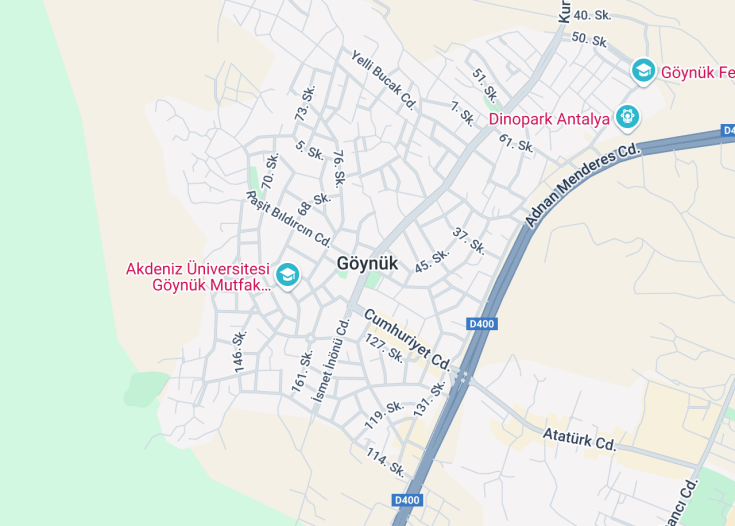Nestled in the serene landscapes of Turkey’s Bolu Province, Göynük is a captivating small town rich with historical and cultural heritage. Renowned for its well-preserved Ottoman houses and the charming Akşemseddin Mausoleum, Göynük offers a picturesque step back in time.
Surrounded by lush forests and the traditional vibe of its quaint streets, this destination is ideal for travelers seeking a peaceful retreat with a touch of historical exploration. The town also hosts vibrant local festivals that showcase the rich culture and traditions of the region, making it an alluring escape for cultural enthusiasts and history buffs alike.
Before venturing to Göynük, be sure to check out the local festival schedules to immerse yourself fully in its cultural heritage during your visit.
Plan to visit during the spring or autumn to enjoy Göynük’s natural landscapes in mild weather, enhancing your experience of the historical sites.
Top things to do & see in Göynük
Select the following sights and activities to discover best tickets and tours available in Göynük.
Göynük: A Hidden Gem by the Sea
| Country | Turkey |
| Time in Göynük | GMT+3 |
| Language spoken | Turkish |
| Population | 6,969 (2022 estimate, Türkiye İstatistik Kurumu) |
| Currency | Turkish Lira (₺, TRY) |
| Airports |
|
Göynük, nestled between the lush Taurus Mountains and the serene Mediterranean Sea, forms part of Turkey’s famous Antalya region. This small resort town, although overshadowed by its more famous neighbors, offers an authentic slice of Turkish coastline with fewer crowds and unspoiled natural beauty. Its significance stems not only from its picturesque setting but also from its historical roots which trace back to the Byzantine and Ottoman eras.
The town’s charm is typified by its long pebble beaches lined with palm trees, traditional Turkish markets, and the welcoming smiles of local vendors. Various rivers and streams that traverse the landscape enrich its flora and fauna, inviting nature lovers and adventure seekers alike. Göynük Canyon, a popular nearby attraction, provides opportunities for hiking, zip-lining, and canyoneering.
Historically, Göynük was an important outpost during the Roman period, providing refuge and a strategic vantage point overlooking the Mediterranean. Several ruins in and around the town testify to its storied past. Today, Göynük continues to draw visitors not only for its natural wonders and historical sites but also for its thriving local cuisine. The town’s eateries offer an array of traditional dishes that make use of the region’s fresh produce, seafood, and spices.
The town also hosts numerous cultural festivals throughout the year, which are vibrant displays of Turkish heritage, music, and dance, reflecting Göynük’s community spirit and cultural pride. With its combination of historic sights, stunning natural landscapes, and rich cultural offerings, Göynük provides a peaceful yet enriching experience to its visitors.
Where is Göynük?
Located in the Antalya Province on the southern coast of Turkey, Göynük is nestled on the Mediterranean shoreline.
Distances:
| Route | Distance by car | Time by car |
|---|---|---|
| Ankara to Göynük | 296 miles (477 km) | 6 hours 15 minutes |
| Istanbul to Göynük | 439 miles (707 km) | 7 hours 30 minutes |
What is Göynük famous for?
Göynükis celebrated for its stunning landscapes that include verdant mountains and turquoise sea waters. It’s also famous for Göynük Canyon, a hotspot for adventurers and nature enthusiasts.
History
Ancient Origins and Byzantine Era (Before 1071)
The history of Göynük dates back to ancient times when it was inhabited by various tribal groups. As part of the Byzantine Empire, the area played a modest role in regional trade and military routes. Its strategic location helped its early settlers prosper modestly, benefiting from the empire’s complex network of trade.
The Seljuk and Ottoman Period (1071-1922)
With the Seljuk victory at the Battle of Manzikert in 1071, Göynük began to see significant changes. It became part of the Seljuk Empire and later the Ottoman Empire. During these times, Göynük served as an important stop on the caravan routes, especially noted for its robust market and caravanserai that hosted traders from across Asia and Europe. The Ottomans also introduced architectural innovations, many of which, like the Akşemseddin Mosque, still stand today as a testament to the town’s historical importance in the region.
Republican Era to Present Day (1923-Present)
Following the establishment of the Republic of Turkey, Göynük experienced a period of transformation and modernization. Recently, it has been recognized as a site of cultural heritage, with efforts underway to preserve its historical structures and revive its ancient traditions. Today, while still holding onto its rich history, Göynük is gradually evolving into a modest tourist destination, celebrating its past while also embracing modern tourism trends.
Visit Göynük
What to see and do in Göynük, Turkey
Exploring Göynük offers a journey through time. Not to be missed:
- The Akşemseddin Mosque, a marvel of Ottoman architecture.
- Historic public baths that reflect the town’s past.
- The Göynük Canyon, perfect for hiking and nature walks.
- Traditional markets where local crafts and foods can be sampled.
Festivals and Events in Göynük
Göynük hosts several cultural events annually, most notably the Göynük Cultural Festival, usually held in the summer months. This festival showcases local music, dance, and traditional crafts, drawing both national and international tourists.
Best time to visit Göynük
The most favorable time to visit Göynük is during the spring (April to June) and fall (September to November) when the weather is mild and conducive for exploring both the historical sites and natural surroundings.
Is Göynük worth visiting?
Göynük is indeed worth visiting, especially for those intrigued by history and nature. The town offers an intricate blend of historical sites dating back to the Byzantine, Seljuk, and Ottoman periods, along with stunning natural landscapes like the Göynük Canyon.
Perfect for a day trip or a quiet weekend getaway, Göynük promises a peaceful retreat from the hustle and bustle of city life.









